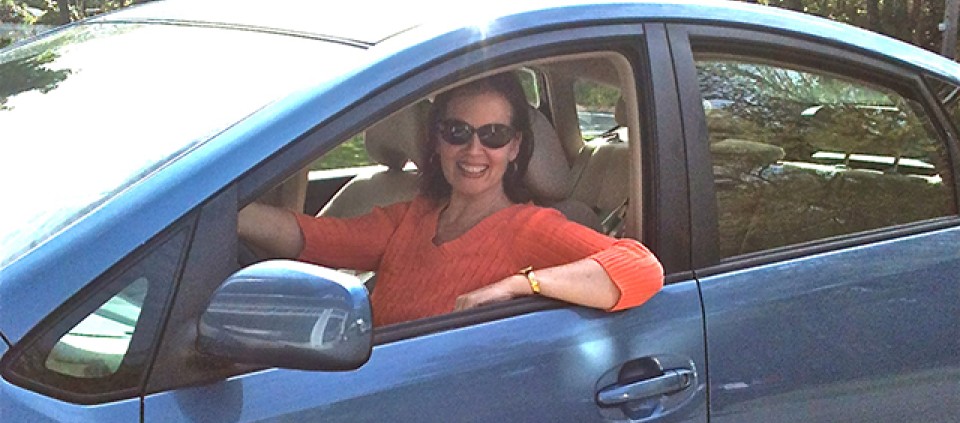Less Is My New More

Last winter, I bought my dream car, a gently used Toyota Prius, because my friend was selling it for a tempting price and our ‘98 Corolla was aging rather ungracefully. I kept my new acquisition off the road for a few months in order to save on car insurance, because I worked from home, my husband commuted by train, and we were managing just fine with one car. At least, that’s what I told myself each time I visited my pretty blue Prius in the garage.
Digging a little deeper, I found a layer of discomfort about owning something that I didn’t really need.
I am a reluctant consumer. I have outfits in my closet that make numerous repeat appearances because I’d rather do almost anything than shop for clothes. I tend to wear the same three pairs of black pants and the same few pairs of gold earrings over and over, which means fewer wardrobe decisions and more mental space for other kinds of creativity.
Our apartment contains furniture and household goods that were handed down from family members, former housemates, and neighbors with good taste (because one woman’s trash can truly be another woman’s treasure). Typically, I buy things in order to replace other things that disappear or no longer work. Period.
I suspect that’s the real reason that I left my shiny Prius in the garage and drove a dented, rusty Corolla until my husband’s new job officially made us a two-car family.
It’s not as if I don’t welcome abundance. When I do splurge, it’s for trips and travel, special meals, workshops, concerts, organic produce, and holistic therapies. I also love having extra money to treat others. I guess it’s just things that I have issues with lately.
My behavior could be traced to a growing eco-consciousness and my thrifty Yankee roots, but that doesn’t tell the whole story. In truth, having too many possessions makes me uncomfortable. Our home is small, simple, and clutter-free, and this just keeps me calm. Possessions require attention and maintenance, and I simply don’t want to put that much time and energy into stuff when there are more interesting things that I could be doing, learning, and thinking about.
My preference for simple living deepened during the summer of 1999, when I came to Kripalu for an extended volunteer residency. I arrived with one big suitcase, a backpack and a sleeping bag for my bunk bed. Nestled in the lush green Berkshires, Kripalu offered me a place to regroup in the middle of a major life transition that spanned nearly three years. Back in New Jersey, the contents of my apartment were sold, left on the curb, or stuffed into the back of my old Honda Civic as I pulled away from my formerly jam-packed life. My load has stayed pretty light since then, by design.
These days, when I’m about to buy something, I ask, “Do I need this? Do I love this? Will I use it?” If it’s no on all three counts, it stays in the store. I’m a notorious “re-gifter” for the same reason. One gift that I do cherish came from my dad last year. It’s a solar-powered, revolving crystal that sticks to my window and showers me with rainbows as I pray and meditate on sunny mornings. Priceless.
In the past few years, this “less is more” philosophy has reshaped my schedule. A former activity junkie suffering from FOMS (Fear of Missing Something, in case you’re new to the acronym), I used to be overscheduled to within an inch of my life. Now I leave lots of soothing white space in my calendar, and I guard my free time like the wealth that it is. The words “crazy busy” will never again escape my lips if I can help it, as I keep releasing my need to fill time with activity.
Embracing spaciousness and “enough-ness” in my home and life has the lovely effect of enhancing my appreciation for what’s already here. Those who study positive psychology call this savoring, and they say it’s good for mental health. I know that when I savor the things, people, and pleasures that I love, life feels very rich indeed. And that, to me, is much more fun than a trip to the mall. Except, perhaps, when I get to drive there in my Prius while cranking my favorite CDs. That’s one collection that I’ll gladly keep around.
Kim Childs is a Boston-based life and career coach and writer who specializes in Positive Psychology. She is also a Kripalu Yoga teacher and facilitator of workshops based on The Artist's Way: A Spiritual Path to Higher Creativity, by Julia Cameron.
© Kripalu Center for Yoga & Health. All rights reserved. To request permission to reprint, please e-mail editor@kripalu.org.
Kim Childs is a Boston-area life and career coach specializing in Positive Psychology, creativity, and spiritual living. She writes for Kripalu.
Full Bio and Programs